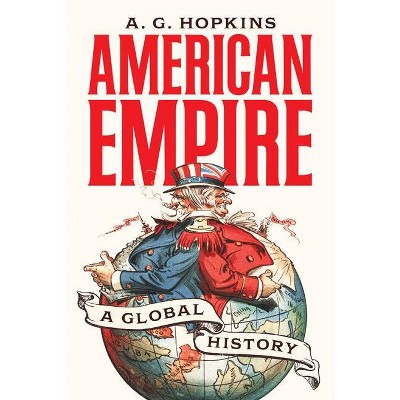Sponsored

Capitalism in the Colonies - by A G Hopkins (Hardcover)
$49.95
In Stock
Eligible for registries and wish lists
Sponsored
About this item
Highlights
- An account that challenges the conventional views of African merchants under colonialism, examining the emergence and changing fortunes of indigenous entrepreneurs in Lagos, Nigeria In Capitalism in the Colonies, A. G. Hopkins provides the first substantial assessment of the fortunes of African entrepreneurs under colonial rule.
- About the Author: A. G. Hopkins is Emeritus Smuts Professor of Commonwealth History at the University of Cambridge and an Emeritus Fellow of Pembroke College, Cambridge.
- 576 Pages
- History, Africa
Description
About the Book
"A look into the Golden Age of African merchants at the end of the nineteenth century, through case studies in Lagos"--Book Synopsis
An account that challenges the conventional views of African merchants under colonialism, examining the emergence and changing fortunes of indigenous entrepreneurs in Lagos, Nigeria
In Capitalism in the Colonies, A. G. Hopkins provides the first substantial assessment of the fortunes of African entrepreneurs under colonial rule. Examining the lives and careers of 100 merchants in Lagos, Nigeria, between 1850 and 1931, Hopkins challenges conventional views of the contribution made by indigenous entrepreneurs to the long-run economic development of Nigeria. He argues that African merchants in Lagos not only survived, but were also responsible for key innovations in trade, construction, farming, and finance that are essential for understanding the development of Nigeria's economy. The book is based on a large, representative sample and covers a time span that traces mercantile fortunes over two and three generations. Drawing on a wide range of sources, Hopkins shows that indigenous entrepreneurs were far more adventurous than expatriate firms. African merchants in Lagos pioneered motor vehicles, sewing machines, publishing, tanneries, and new types of internal trade. They founded the construction industry that built Lagos into a major port city, moved inland to start the cocoa-farming industry, and developed the finance sector that is still vital to Nigeria's economy. They also took the lead in changing single-owned businesses into limited liability companies, creating freehold property rights and promoting wage labour. In short, Hopkins argues, they were the capitalists who introduced the institutions of capitalism into Nigeria. The story of African merchants in Nigeria reminds us, he writes, that economic structures have no life of their own until they are animated by the actions of creative individuals.Review Quotes
"[A] magisterial study."---Lisa Lyndsay, Journal of Social History
"We can now build economic histories of West Africa on a much firmer footing; and for this we have A. G. Hopkins to thank."---Reuben Loffman, Times Literary Supplement
"Capitalism in the Colonies is a masterful history of the emerging merchant class in Lagos, Nigeria, during the advent of British colonial rule. . . . Highly recommended."-- "Choice"
About the Author
A. G. Hopkins is Emeritus Smuts Professor of Commonwealth History at the University of Cambridge and an Emeritus Fellow of Pembroke College, Cambridge. He is the author of An Economic History of West Africa, American Empire: A Global History (Princeton), Africa, Empire, and World Disorder: Historical Essays, and (with P. J. Cain) British Imperialism, 1688-2016.Dimensions (Overall): 9.4 Inches (H) x 6.1 Inches (W) x 1.6 Inches (D)
Weight: 2.15 Pounds
Suggested Age: 22 Years and Up
Number of Pages: 576
Genre: History
Sub-Genre: Africa
Publisher: Princeton University Press
Theme: West
Format: Hardcover
Author: A G Hopkins
Language: English
Street Date: July 16, 2024
TCIN: 91573495
UPC: 9780691258843
Item Number (DPCI): 247-35-0017
Origin: Made in the USA or Imported
If the item details aren’t accurate or complete, we want to know about it.
Shipping details
Estimated ship dimensions: 1.6 inches length x 6.1 inches width x 9.4 inches height
Estimated ship weight: 2.15 pounds
We regret that this item cannot be shipped to PO Boxes.
This item cannot be shipped to the following locations: American Samoa (see also separate entry under AS), Guam (see also separate entry under GU), Northern Mariana Islands, Puerto Rico (see also separate entry under PR), United States Minor Outlying Islands, Virgin Islands, U.S., APO/FPO
Return details
This item can be returned to any Target store or Target.com.
This item must be returned within 90 days of the date it was purchased in store, shipped, delivered by a Shipt shopper, or made ready for pickup.
See the return policy for complete information.
Trending Non-Fiction

$15.68
Buy 2, get 1 free select books
4.8 out of 5 stars with 180 ratings


$19.58
MSRP $29.00
Buy 2, get 1 free select books
4.7 out of 5 stars with 11 ratings

$4.59
MSRP $7.99
Buy 2, get 1 free select books
4.8 out of 5 stars with 116 ratings

$6.20
MSRP $10.95
Buy 2, get 1 free select books
4.8 out of 5 stars with 32 ratings

$7.09
MSRP $9.99
Buy 2, get 1 free select books
4.9 out of 5 stars with 45 ratings
Discover more options

$13.49
MSRP $14.99
Buy 2, get 1 free select books
5 out of 5 stars with 1 ratings

$10.64 - $16.99
MSRP $14.99 - $24.99
Buy 2, get 1 free select books
5 out of 5 stars with 1 ratings



